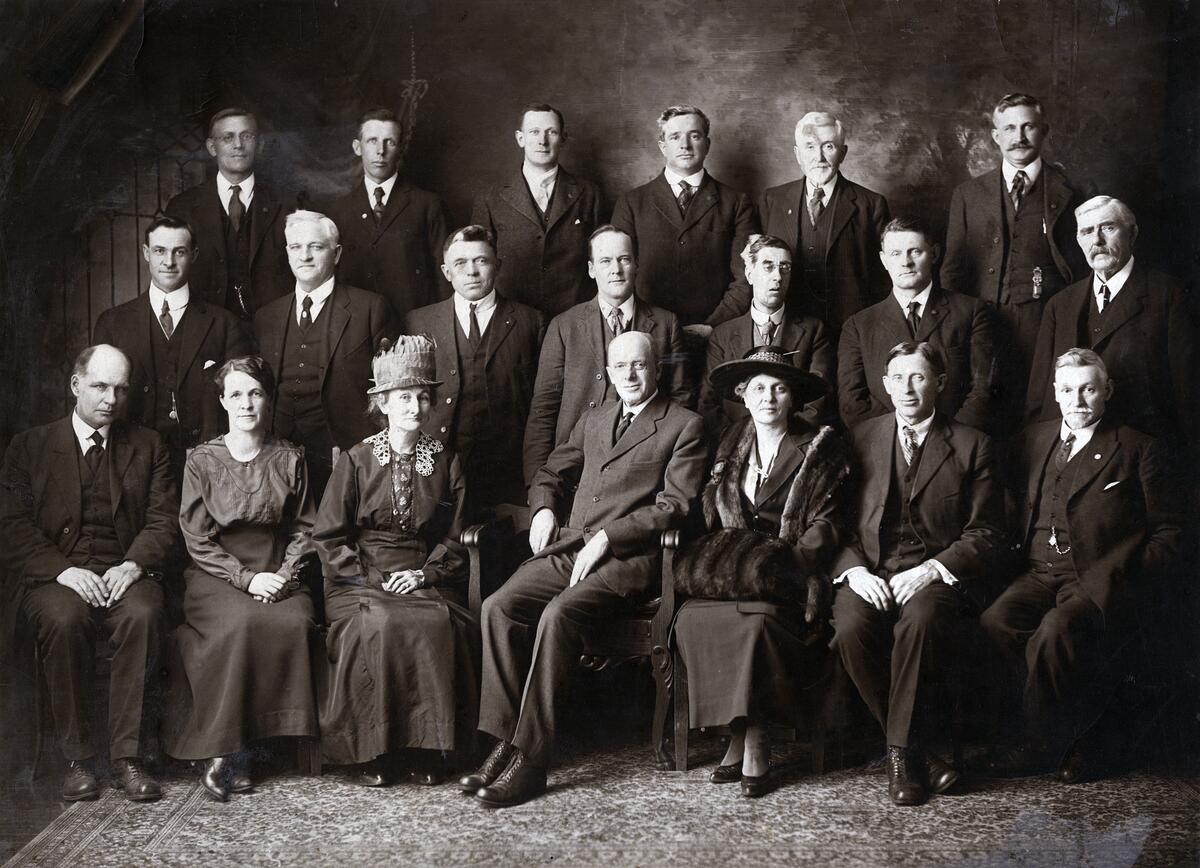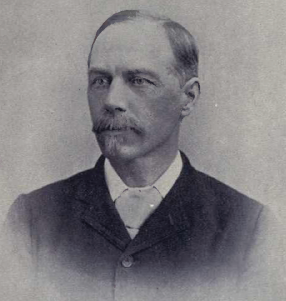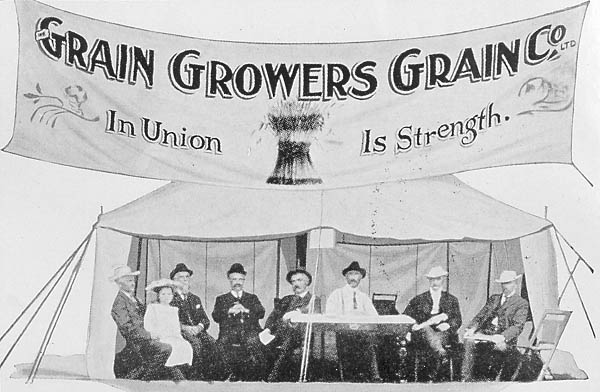|
Territorial Grain Growers' Association
The Territorial Grain Growers' Association (TGGA) was a farmer's association that was active in Western Canada at the start of the 20th century, in what was then the Northwest Territories and later became Saskatchewan and Alberta. It provided a voice for farmers in their struggle with grain dealers and the railways, and was influential in obtaining favorable legislation. After Alberta and Saskatchewan became provinces the TGGA was succeeded by the Alberta Farmers' Association and the Saskatchewan Grain Growers' Association. Background At the start of the 20th century the North-West Elevator Association, closely associated with the Winnipeg Grain Exchange, controlled over two thirds of the grain elevators on the prairies. The elevator companies, working together, could force the farmers to accept low prices for their grain. When there were shortages of rail cars the railways gave preferential treatment to the companies over the farmers. The 1908 "Partridge Plan" listed other "ill p ... [...More Info...] [...Related Items...] OR: [Wikipedia] [Google] [Baidu] |
Alberta Farmers' Association
The Alberta Farmers' Association (AFA) was a farmer's association that was active in Alberta, Canada from 1905 to 1909. It was formed from the Alberta branch of the Territorial Grain Growers' Association (TGGA) when Alberta became a province in 1905. It provided a voice for farmers in their struggle with grain dealers and the railways. In January 1909 it merged with the Canadian Society of Equity to form the United Farmers of Alberta. Background The Manitoba Grain Act was passed in 1901, designed to prevent abuses by grain dealers and railways and ensure fair practices and prices in the booming grain trade in the prairie provinces of Canada. There was a bumper crop that year, and farmers found they could not get their produce to market because the Canadian Pacific Railway (CPR) and the grain companies were still failing to conform to the act. In response, farmers formed the Territorial Grain Growers' Association (TGGA) in January 1902. The TGGA had succeeded in getting the Manitoba ... [...More Info...] [...Related Items...] OR: [Wikipedia] [Google] [Baidu] |
Sintaluta
Sintaluta () is a town in Saskatchewan, Canada. The population of Sintaluta is 124 people according to the 2021 Census of Population. The town is about 85 km east of Regina. The town is on the north side of the Trans-Canada Highway. The name ''Sintaluta'' comes from the Lakota phrase , meaning 'red tail', referring to the tail of the red fox. It is the administrative headquarters of the Carry the Kettle Nakoda Nation band government. History The first section foreman for the Canadian Pacific Railway (CPR) came to Sintaluta in 1886. The first railway station opened here in 1898. When Saskatchewan became a province in 1905, the people of the settlement soon set into action the application that this place should be incorporated into a town. This happened in 1907. Before the Canadian Pacific Railway (CPR) made its way across the west, the pioneers would stop at Sintaluta to refresh their supplies before heading west. In 1881, the first stopping house was established at ... [...More Info...] [...Related Items...] OR: [Wikipedia] [Google] [Baidu] |
Organizations Based In Saskatchewan
An organization or organisation (Commonwealth English; see spelling differences) is an entity—such as a company, or corporation or an institution (formal organization), or an association—comprising one or more people and having a particular purpose. Organizations may also operate secretly or illegally in the case of secret societies, criminal organizations, and resistance movements. And in some cases may have obstacles from other organizations (e.g.: MLK's organization). What makes an organization recognized by the government is either filling out incorporation or recognition in the form of either societal pressure (e.g.: Advocacy group), causing concerns (e.g.: Resistance movement) or being considered the spokesperson of a group of people subject to negotiation (e.g.: the Polisario Front being recognized as the sole representative of the Sahrawi people and forming a partially recognized state.) Compare the concept of social groups, which may include non-organiz ... [...More Info...] [...Related Items...] OR: [Wikipedia] [Google] [Baidu] |
1906 Disestablishments In Canada
Nineteen or 19 may refer to: * 19 (number) * One of the years 19 BC, AD 19, 1919, 2019 Films * ''19'' (film), a 2001 Japanese film * ''Nineteen'' (1987 film), a 1987 science fiction film * '' 19-Nineteen'', a 2009 South Korean film * '' Diciannove'', a 2024 Italian drama film informally referred to as "Nineteen" in some sources Science * Potassium, an alkali metal * 19 Fortuna, an asteroid Music * 19 (band), a Japanese pop music duo Albums * ''19'' (Adele album), 2008 * ''19'', a 2003 album by Alsou * ''19'', a 2006 album by Evan Yo * ''19'', a 2018 album by MHD * ''19'', one half of the double album '' 63/19'' by Kool A.D. * ''Number Nineteen'', a 1971 album by American jazz pianist Mal Waldron * ''XIX'' (EP), a 2019 EP by 1the9 Songs * "19" (song), a 1985 song by British musician Paul Hardcastle * "Stone in Focus", officially "#19", a composition by Aphex Twin * "Nineteen", a song from the 1992 album ''Refugee'' by Bad4Good * "Nineteen", a song from the ... [...More Info...] [...Related Items...] OR: [Wikipedia] [Google] [Baidu] |
United Farmers Of Alberta
The United Farmers of Alberta (UFA) is an association of Alberta farmers that has served different roles in its 100-year history – as a lobby group, a successful political party, and as a farm-supply retail chain. As a political party, it formed the government of Alberta from 1921 to 1935. Since 1935, it has primarily been an agricultural supply cooperative headquartered in Calgary, Alberta. , UFA operates 34 farm and ranch supply stores in Alberta and over 110 fuel stations in British Columbia, Alberta and Saskatchewan. Founding as lobby group UFA was founded in 1909 as a government lobbying, lobby group following a merger between the Alberta Farmers' Association and Alberta branches of the Canadian Society for Equity. The UFA began as a non-partisan organization whose aim was to be a lobby group promoting the interest of farmers in the province. In 1913, under president William John Tregillus, the UFA successfully pressured Alberta's Alberta Liberal Party, Liberal governmen ... [...More Info...] [...Related Items...] OR: [Wikipedia] [Google] [Baidu] |
Strathcona, Alberta
Strathcona was a city in Alberta, Canada, on the south side of the North Saskatchewan River. Originally founded in 1891 as a railway centre, it became a town in 1899, then a city in 1907. It amalgamated with the City of Edmonton in 1912. History Strathcona's recorded history began in the 1870s. Its first residents were an offshoot of the hangers-on and self-employed contractors who resided near the old Fort Edmonton on the north side of the river. This mixed community of British (especially Orkney), Québécois, Cree and Metis fur trade employees, pioneer farmers, hunters, and their families, was mostly replaced by eastern Canadian pioneer farmers (and land speculators) in the 1880s.Monto, Tom (2011). ''Old Strathcona, Edmonton's Southside Roots''. Edmonton: Crang Publishing. This notably included the Papaschase First Nation, who were initially granted approximately of reserve lands in the area through Treaty 6, but were allegedly dispersed in 1888 due to pressure from ... [...More Info...] [...Related Items...] OR: [Wikipedia] [Google] [Baidu] |
Rice Sheppard
Rice Sheppard (April 2, 1861 – August 26, 1947) was a politician and farmers' activist in Alberta, Canada. He served on Edmonton City Council for many years, ran for mayoral, provincial, and federal office, and was an executive member of the United Farmers of Alberta. Early life Sheppard was born April 2, 1861, in Lambourn, Berkshire, England and was educated at the Wesleyan School. His father was James Sheppard, who was married to Louisa (née Barrett) Sheppard and in total they had 13 children. Family stories say that the Sheppard family was thrown out of Lambourn by the Squire for not being Church of England, although this would have been unlikely as there were many non-conformists in the town by this time, and there was no effective 'squire' anymore. James and Louisa moved to Essex, England. Rice took his first job when he was ten years old, working at a store. At the age of twenty-one, he opened a bakery in Clapham; this business expanded to four shops by the time that he s ... [...More Info...] [...Related Items...] OR: [Wikipedia] [Google] [Baidu] |
Grain Growers' Grain Company
The Grain Growers' Grain Company (GGGC) was a farmers' cooperative founded in the prairie provinces of western Canada in 1906. The GGGC met strong resistance from existing grain dealers. It was forced off the Winnipeg Grain Exchange and almost failed. With help from the Manitoba government it regained its seat on the exchange, and soon had a profitable grain trading business. The company founded the ''Grain Growers' Guide'', which became the most popular farmer's newspaper in the region. In 1912 the GGGC began operating inland and terminal grain elevators, and in 1913 moved into the farm supply business. The GGGC was financially secure and owned or operated almost 200 elevators as well as 122 coals sheds and 145 warehouses by the time it merged with the Alberta Farmers' Co-operative Elevator Company to form the United Grain Growers in 1917. Foundation The GGGC was largely the creation of the agrarian activist Edward Alexander Partridge, an "impetuous and idealistic" man. He was cal ... [...More Info...] [...Related Items...] OR: [Wikipedia] [Google] [Baidu] |
Winnipeg Grain Exchange
The Winnipeg Grain Exchange (Known too as ''ICE Futures Canada'') was established in 1887, and dissolved in 1986. It was also the predecessor of the Winnipeg Commodity Exchange. List of presidents :''This table (information), table represents the list of presidents of the exchange.'' The exchange had 97 presidents, Of which: * The wikt:first, first chairman is Daniel Hunter McMillan; * The last chairman is C. Swartz; References Organizations based in Winnipeg {{Canada-org-stub ... [...More Info...] [...Related Items...] OR: [Wikipedia] [Google] [Baidu] |
Edward Alexander Partridge
Edward Alexander Partridge (5 November 1861 – 3 August 1931) was a Canadian teacher, farmer, agrarian radical, businessman and author. He was born in Ontario but moved to Saskatchewan where he taught and then became a farmer. He was active in the Territorial Grain Growers' Association (TGGA), founded in 1902, which addressed various problems with the Western Canada grain market. He founded the cooperative Grain Growers' Grain Company, the predecessor of the United Grain Growers, and the ''Grain Growers' Guide'', a widely distributed weekly paper. His "Partridge Plan" was a broad and visionary proposal for addressing a wide range of farmers' issues, eliminating many abuses caused by the near-monopoly of grain elevator companies, and resulted in important reforms by the provincial governments. Patridge was named a National Historic Person in 2018. [...More Info...] [...Related Items...] OR: [Wikipedia] [Google] [Baidu] |
Brandon, Manitoba
Brandon () is the second-largest city in the province of Manitoba, Canada. It is located in the southwestern corner of the province on the banks of the Assiniboine River, approximately west of the provincial capital, Winnipeg, and east of the Saskatchewan border. Brandon covers an area of with a population of 51,313, and a census metropolitan area population of 54,268. It is the primary hub of trade and commerce for the Westman Region and parts of southeastern Saskatchewan, an area with a population of more than 190,000 people. The City of Brandon was incorporated in 1882, having a history rooted in the Assiniboine River fur trade as well as its role as a major junction on the Canadian Pacific Railway. Known as ''The Wheat City'', Brandon's economy is predominantly associated with agriculture, as well as health care, manufacturing, food processing, education, business services, and transportation. Brandon's post-secondary institutions include Brandon University, Assiniboine ... [...More Info...] [...Related Items...] OR: [Wikipedia] [Google] [Baidu] |




